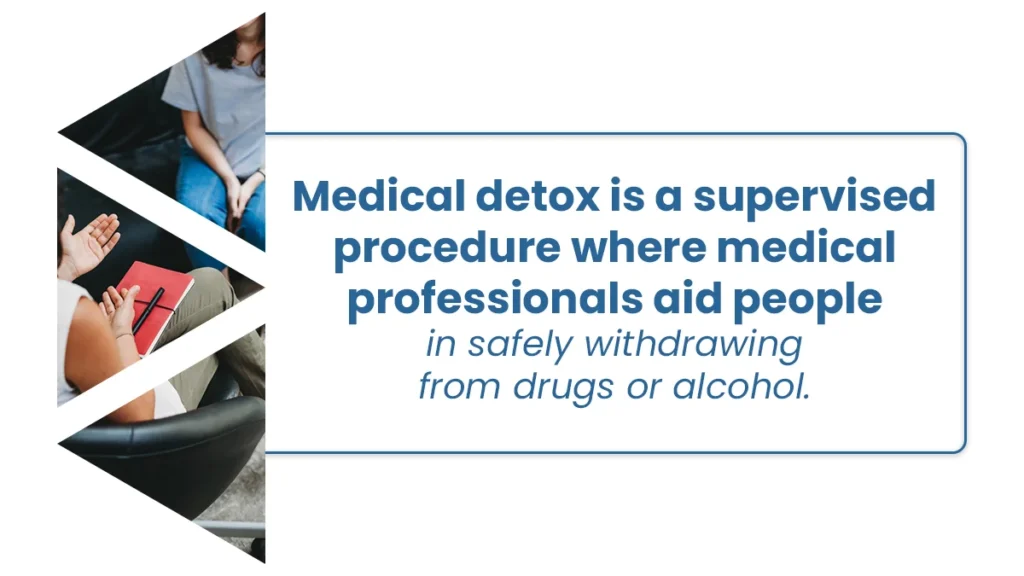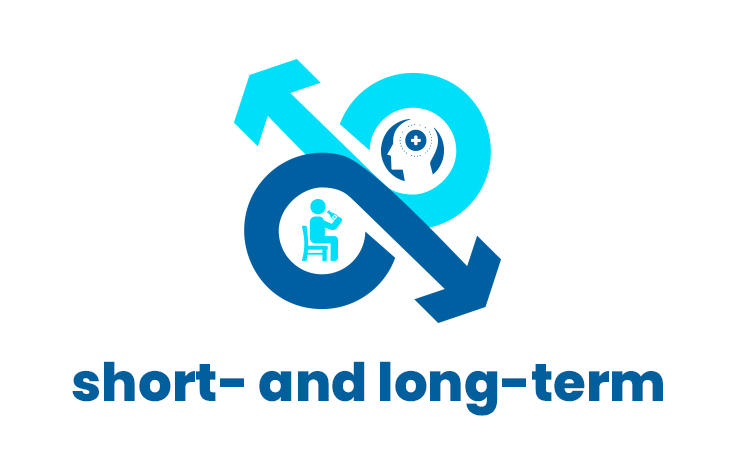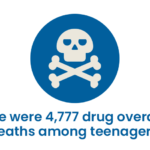Drug and alcohol misuse can take a heavy toll on one’s life, but the journey toward sobriety is within reach for everyone. The first step in this journey is often a process of detoxification.
It’s a critical stage where the body clears itself of harmful substances, paving the way for a fresh start. This article seeks to guide people through detox, making it less daunting and more understandable.

We’ll provide a comprehensive look at what detox involves, highlighting its importance in the broader recovery context. Whether you’re considering detox for yourself or a loved one or wish to expand your understanding, this article aims to be a useful resource.
Here, we present a simplified yet thorough guide to navigating the drug and alcohol detox process, offering valuable insights to assist in the critical first steps of the recovery journey.
Key Takeaways
Drug and alcohol misuse can take a heavy toll on one’s life. Medical detox is a phase where medical experts aid people in safely withdrawing from drugs or alcohol.
- Detox manages physical withdrawal symptoms by clearing the body of harmful substances and preparing individuals for further treatment.
- Professionals should supervise medical detox.
- Support networks can provide significant emotional strength during this time.
- Choosing a suitable detox facility depends on individual needs.
The Haven Detox-South Florida is always prepared to give quality care to its patients. Contact us at (561) 328-8627 and get instant aid.
What is Medical Detoxification
Medical detox is a supervised procedure where medical professionals aid people in safely withdrawing from drugs or alcohol. This process can be tricky, as the body has become reliant on these substances.
But under medical supervision, detox can be safer and more comfortable. The goal of medical detox is two-fold. First, it helps manage the physical effects of withdrawal.
Second, it prepares individuals for subsequent recovery, such as therapy or counseling. It’s important to note that detox alone isn’t enough for complete healing. It’s the first step in a longer journey.
During detox, a team of healthcare professionals monitors you closely. They may administer medications to ease withdrawal symptoms and prevent complications.
Each person’s detox plan is different, tailored to their specific needs. Factors like the type of substance, the length of use, and individual health conditions influence the approach taken.
Withdrawal symptoms can even range from mild to severe. They might include anxiety, restlessness, or sleep problems.
In some cases, withdrawal can lead to serious health issues, like seizures or hallucinations. It is why people should detox under professional supervision. While it might seem scary, remember that medical detox is designed to help, not harm. It’s a vital first step in the path to recovery.
Medical professionals are there to provide support, care, and expertise. They can make the detox process as safe and comfortable as possible. Medical detox is an important, supervised process to manage withdrawal from drugs or alcohol. It prepares individuals for further steps in their recovery journey.
The process is tailored to each person’s needs, ensuring it is as safe and effective as possible. Undergoing medical detox is a brave decision, beginning a journey toward a healthier, substance-free life.
Why Detox Is Important for Recovery
Detox is a vital phase of recovery from drug or alcohol misuse. It is the initial phase in treating substance dependency, allowing the body to rid itself of harmful substances.
Physical dependence on drugs or alcohol often leads to withdrawal symptoms when one stops using them. These symptoms can be uncomfortable, even dangerous, without proper supervision. Detox provides a safe environment to manage these symptoms under the watchful eyes of healthcare professionals.
Furthermore, detox prepares individuals for the following stages of recovery. It helps clear the mind, aiding individuals to engage in treatment programs fully. These programs could include therapy or counseling to address the root causes of addiction.
It’s essential to remember that detox is not a cure for addiction. It’s the first crucial step toward recovery. Detox alone doesn’t guarantee long-term sobriety. However, it serves as a solid foundation for the following complete treatment.
Detox is vital for recovery because it provides a supervised, safe start to sobriety. It sets the stage for effective treatment and long-term recovery from drug and alcohol misuse under medical supervision.
The Detox Process
The detox process is a crucial step to recovery from substance misuse. It involves the body purging itself of harmful substances, supervised by healthcare professionals.
It can be a challenging phase, as withdrawal symptoms might occur. However, these are managed in a safe, controlled environment during detox. The process varies for each individual, shaped by factors like the substance used and personal health conditions. While detox isn’t the whole solution to addiction, it’s a crucial starting point.
It paves the way for further treatment, setting the stage for a successful recovery journey. Here are some of the process stages:
Evaluation and Assessment
The first step in the detox process is evaluation and assessment. Healthcare experts gather detailed information about a person’s substance use, physical and mental health. This data helps to create a personalized detox plan.
The assessment may involve medical tests to detect drugs in the person’s system and measure their concentration. This information guides the treatment team in predicting and managing potential withdrawal symptoms.
Stabilization
Next comes stabilization, the core part of detox. This stage aims to guide individuals safely through withdrawal. Medical staff may use medications to ease symptoms and prevent medical complications.
They also provide psychological support to help individuals cope with changes in mood and behavior. The goal is to reach a state where the person is physically stable, no longer reliant on the substance, and mentally prepared for recovery.
Transition to Treatment
The final stage is the transition to ongoing treatment. Detox, while essential, is just the beginning of the recovery journey.
Long-term change requires more than just clearing the body of harmful substances. It is why the focus shifts to a comprehensive treatment program after detox. The program may include therapy, counseling, medication, and support groups.
During the transition phase, the treatment team works with individuals to develop a tailored plan for continued recovery. They provide information about available treatment options, helping individuals make informed decisions about their next steps.
Tips for Managing Withdrawal Symptoms
Withdrawal can be a tricky part of detox, but there are ways to manage these symptoms. Here are some tips to help:
Seek Professional Support
First and foremost, professional help is essential. Attempting to manage withdrawal symptoms alone can be dangerous.
Medical professionals provide the safest environment for detox. They can monitor signs, administer medication, and intervene in emergencies.
Stay Hydrated
Withdrawal often leads to physical symptoms like sweating or vomiting, which can cause dehydration. Drinking plenty of fluids helps to maintain hydration and balance in the body.
Maintain a Balanced Diet
Proper nutrition is vital during detox. Nutrient-rich foods can help strengthen the body and aid in recovery. Add fruits, vegetables, lean proteins, and whole grains to your meals.
Rest
Withdrawal can be physically and emotionally exhausting. Ensure you get plenty of rest to aid your body’s recovery process.
Practice Relaxation Techniques
During detox, mental and physical wellness are equally important. Mindfulness exercises or deep-breathing techniques can help manage stress and anxiety linked with withdrawal.
Stay Active
Light bodily activity, such as yoga or walking, can help distract the mind and promote overall well-being. Always consult with healthcare professionals before starting any exercise regimen.
Stay Engaged in Treatment
Follow your treatment plan closely. Attend all scheduled meetings and try to participate fully in therapies or counseling sessions.
Seek Support
Support from family, friends, or support groups can be invaluable. Knowing you’re not alone can provide emotional strength during this challenging time.
Managing withdrawal symptoms involves professional support, self-care, and commitment to the treatment process. Remember, these withdrawal symptoms are temporary. Each day you’re one step closer to recovery. With patience, persistence, and the right help, you can navigate withdrawal and move towards a healthier, substance-free life.
Choosing a Detox Facility
Choosing a suitable detox facility is a crucial decision on the path to recovery. You’ll mainly consider two options, inpatient and outpatient facilities.
In an inpatient facility, individuals stay at the center throughout their detox. This option provides a highly structured environment, 24-hour medical support, and isolation from potential triggers. It’s often best for individuals with severe addiction, those with a history of relapse, or those who lack a supportive home environment.
On the other hand, outpatient facilities allow individuals to live at home while receiving treatment. This option offers greater flexibility, allowing individuals to maintain their work or family commitments. It’s typically less expensive and can be effective for individuals with a mild addiction, a robust support system at home, or those who cannot take time away from their daily duties.
Both options have strengths, and the best choice depends on individual circumstances. When choosing, consider factors like the severity of the addiction, personal responsibilities, support at home, and financial capabilities.
Remember, the goal is to select a facility that best supports your journey to recovery. Consulting with healthcare professionals can also help in making this vital decision.
Frequently Asked Questions (FAQ)
What are the three methods of detoxification?
Three standard detox methods include medical detox, self-detox, and rapid detox. Medical detox is the safest option, supervised by healthcare professionals who manage withdrawal symptoms.
Self-detox, while not recommended due to risks, involves individuals attempting to detox alone. Rapid detox is a medical procedure where patients are sedated and given medications to accelerate withdrawal. This method, however, is controversial due to potential health risks.
What is the detoxification process?
Detox is the process of detaching harmful substances from the body. This initial step in substance misuse recovery involves managing physical withdrawal symptoms under medical supervision.
It has three stages, evaluation and assessment, stabilization, and transition to ongoing treatment. This process varies for each individual, depending on the substance used and personal health conditions.
What are the five steps of recovery from drug addiction?
The five steps of recovery from drug addiction often include acceptance, detoxification, rehabilitation, maintenance of sobriety, and ongoing recovery.
Acceptance involves acknowledging the problem and deciding to seek help. Detoxification is the medical process of eliminating a substance from the body. Rehabilitation requires therapy and counseling to address the root causes of addiction.
Maintenance of sobriety is about preventing relapse, often involving lifestyle changes and ongoing support. Ongoing recovery is the lifelong commitment to sobriety, affecting personal growth and wellness.
Get Quality Care at The Haven Detox-South Florida
If you’re grappling with substance use disorders, especially alcohol addiction, taking that last drink can lead to withdrawal symptoms. At The Haven Detox-South Florida, our alcohol detox programs are designed to support you during this difficult time.
As a leading treatment facility, we understand the complexities of alcohol withdrawal and substance abuse. Our expert team offers complete addiction treatment services that address your unique needs, including detoxification.
Experience the benefits of our residential program and SMART recovery approaches. We’re ready to guide you if you desire to help a loved one. Preparing for admission is straightforward with our support. Take your first step towards a healthier future.Contact us at (561) 328-8627 today, and let us assist you as you travel the road to recovery.











